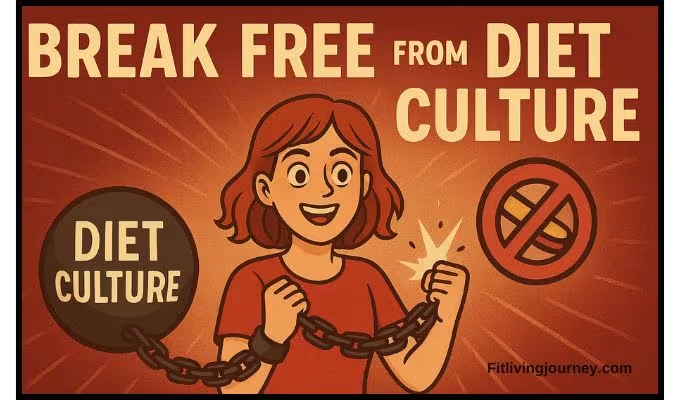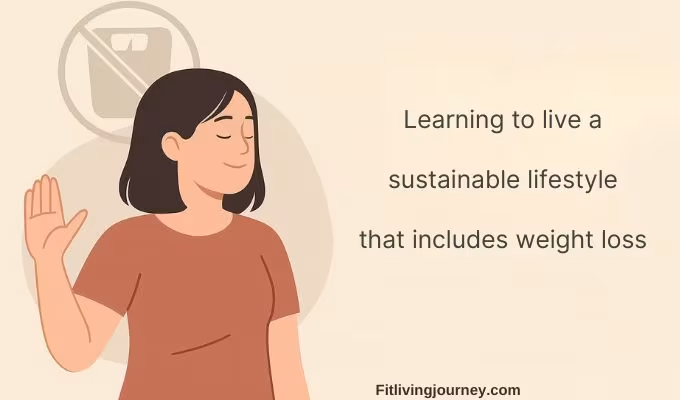Diet Culture
Today we’re talking about diet culture—a topic that truly speaks to my heart.
I’m passionate about letting go of the rules that diet culture imposes and instead learning how to live a sustainable lifestyle, even while aiming for weight loss.
Let’s have an honest conversation about what diet culture is and how we can finally break up with it for good.
The Number on the Scale Isn’t Everything
Have you ever told yourself:
“I feel good, I feel healthy, my clothes fit, but I still need to hit that number on the scale”?
If yes, then that’s a clear sign—you’re stuck in diet culture. Don’t be hard on yourself. It’s not your fault.
We’ve all been told, over and over again, especially through tools like the BMI chart, that we must be a certain number to be considered healthy.
But here’s the truth: BMI is outdated.
According to the BMI scale, I’m considered overweight or even obese—but I don’t follow it, and neither should you.
Escaping the Diet Cycle
What we often fall into is something called the diet cycle—a constant loop of losing and gaining weight.
Think of the freshman 15 we gain in college and the years we spend trying to lose it.
We shed pounds only to gain them back.
This weight cycling wreaks havoc on our bodies—especially our metabolism.
When we restrict calories, then binge, then restrict again, our metabolism doesn’t know how to keep up.
This leads to something called metabolic adaptation—our metabolism slows down whether we’re under-eating or over-eating.
And repeated cycles like this damage it even more.
The Fine Line: Eating Enough but Not Too Much
Fixing your metabolism isn’t about extremes.
It’s about balance—eating enough, but not excessively.
There’s a fine line between correcting your metabolism and pushing it further out of sync.
Long-term success comes from walking that line carefully.
Reframing Health and Body Image
Sometimes, even when we look good, feel good, and are healthy, we still obsess over the number on the scale.
That’s when it’s time to reprogram your mindset.
Health isn’t about a number—it’s about how you live, feel, and move in your body.
Practical Steps to Break Free from Diet Culture
- Eat Intuitively
Listen to your body. Eat when you’re hungry and stop when you’re satisfied—not when you’re full.
This doesn’t mean tracking calories or macros every day.
It means being aware, but also in tune with your body’s needs.
- Include Low-Impact Exercise
You don’t need to spend hours at the gym. Walking is one of the best exercises for weight loss.
Add some strength training to reshape your body, build muscle, and boost metabolism.
Make it a part of life—not a punishment.
- Do a Social Media Cleanup
Unfollow those who shame your body, push restrictive eating, or make you feel like you’re not enough.
Follow those who encourage a positive, realistic health journey.
The content you consume shapes your mindset.
- Set Boundaries in Relationships
If friends or family shame your body or try to derail your journey, have honest conversations.
If they still don’t support you, it’s okay to distance yourself.
You deserve encouragement, not judgment.
- Practice Self-Compassion
You’re human. You won’t be perfect every day.
Follow the 80/20 rule—80% of the time, stay on track; 20% of the time, live your life.
Progress is not about perfection—it’s about consistency with kindness.
It’s Time to Let Diet Culture Go
Diet culture isn’t helping us—it’s hurting us. It’s time to live in a way that’s healthy, sustainable, and kind to ourselves.
Let’s stop chasing a number and start building a life that feels good in every way—physically, mentally, and emotionally.
Q 1. What is diet culture?
Ans. Diet culture is the belief that appearance and body shape are more important than physical or emotional well-being, often measured by a number on the scale.
Q 2. Why is weight cycling harmful?
Ans. Repeatedly losing and regaining weight can damage metabolism, lead to long-term weight gain, and negatively impact both mental and physical health.
Q 3. What is intuitive eating?
Ans. It’s a way of eating where you listen to your body—eating when you’re hungry and stopping when satisfied, without rigid rules or calorie tracking.
Q 4. Can walking really help with weight loss?
Ans. Yes, walking is an effective, low-impact exercise that supports weight loss, especially when paired with consistent habits and mindful eating.
Q 5. How do I handle people who shame my body?
Ans. Set clear boundaries. Have honest conversations, and if needed, limit your interaction. Surround yourself with those who support and uplift you.


